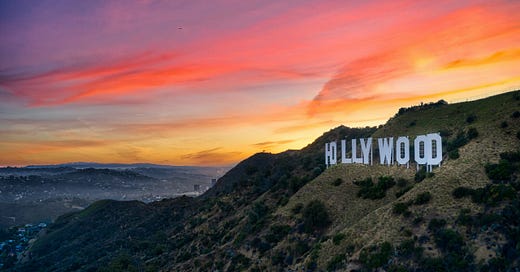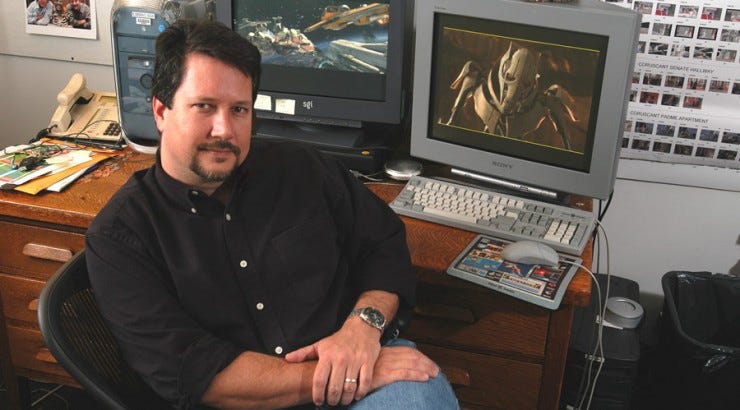TMS Discussion: Where Is Hollywood Lately?
(via griffithobservatory.org)
Only three months after confirming my ‘no politics’ stance on this newsletter while praising Frank Capra’s Mr. Smith Goes to Washington (1939), I’m treading those waters again. But I’m not going to be talking about direct political activity like budgets, tax cuts, tariffs, red vs. blue, right vs. left, et al. But something more in my wheelhouse, ✨Hollywood✨ and its relation to the 📱tech industry.📱 Following this very eye-opening video essay by PoliSci influencer Joanna Richards blowing up on corners of social media this past month, the general public got a whiff of how tech CEOs are seriously banking on the US collapsing so hard, they’ll be able to swoop right in and supposedly save the day with their uber advanced, powerful AI and smart devices to create thousands of ‘network states’ that would be overseen by these dozen or so men. Instead of paying the taxman for the right of living, you would be directly paying these CEOs. Instead of cashiers, designers, editors, operators, security guards, etc. all these types of in-person jobs would be digitally replaced by Palantir. Instead of an organic, naturally strong army of real humans, we would have millions of supercharged drones and robots powered by Anduril. While all of this sounds like something out of a Cyberpunk plot, these guys have openly talked about their goals and plans on podcasts and public conventions, as highlighted numerously throughout Jo’s video. Some experimental ‘network cities’ already exist abroad in places like Africa, Nigeria, Palau and Honduras. This…all sounds batsh!t insane to me, but hey, I’m just a lady who watches movies and listens to music a lot.
As I was trying not to lose my mind over the possibility of something this dystopian going through, I also kept noticing the film & TV industry has been rather quiet lately. Unusually quiet. Outside of the typical updates related to awards season, which was already halfway through when Inauguration Day hit, and some casting/production announcements; we haven’t received many soundbites on the state of the country like we often do from politically active stars and filmmakers. There have been a handful of basic “let’s do better as Americans” and “this administration sucks” acceptance speeches at awards shows, but nothing specifically targeted. Even conservative/right-winged actors have been MIA recently, including presidentially appointed ‘ambassadors to Hollywood’ Jon Voight and Mel Gibson…Where is everyone? Have the people and the media decided there are more important things to focus on lately? Are current events actually affecting celebrities too? Are they complicit? Before tech companies took over consumerism in the US, cinema was the biggest money-making industry here. Way back in 1939, studios were overwhelmed with demand for new releases by both theaters and audiences because films were doing so well. Well, in my opinion, I think for maybe the first time in history, we’re going to see a divide between the tech industry and the other, more traditional mega corporations in the western world.
(via chapman.edu)
While businesses love making money, these tech guys have decided to speedrun right past capitalism and go straight to feudalism. It’s not enough to run the biggest companies in the world anymore, you have to manage land now too. Feudalism doesn’t have a great track record historically, yet like most cases of ultimate power, “This time it’s really going to work, you guys!” A billionaire might be feeling confident in taking a risk this gigantic, but the rest of the population is most likely not, including other wealthy executives in charge of entertainment, fashion, food, travel, tourism, etc. After all, with more inflation on the way, people are going to go to the movie theater less and limit their streaming services. The sale sections of clothing stores are going to be more popular than brand new inventory. Tech companies must really believe their plan is eventually going to work, because I’m seeing a lot of people already planning on shopping locally instead of online and not buying new devices anytime soon.
Hollywood is connected to all this more than general consumerism, since the places who manufacture the tools for animation, set equipment and special effects are also used to make digital hardware and software. ILM and LucasFilm are located very close to Silicon Valley, CA, and I can imagine there is some overlap in affiliates and friendships. Director-producer Steven Spielberg has been a champion of video games since the 1980s, with even his classic film Saving Private Ryan (1998) influencing the existence of Activision’s Call of Duty games since 2003. The CCO of ILM, John Knoll, is a big figure in both film/TV and technology. Initially a camera operator and digital artist for films like Spielberg’s Empire of the Sun (1987) and James Cameron’s The Abyss (1989), he quickly rose to visual effects supervisor for popular movies like John McTiernan’s The Hunt for Red October (1990), David Carson’s Star Trek Generations (1994), Brian De Palma’s Mission: Impossible (1996), George Lucas’ Star Wars prequels (1999-2005) and Gore Verbinski’s Pirates of the Caribbean trilogy (2003-07). These days, Knoll is most famous for co-creating the graphics editing program Adobe Photoshop with his brother Thomas in 2007. Before generative AI, Photoshop was the process amateur artists [i.e. a ton of my classmates in film school] used for photo manipulation, as well as a tool for professional artists and editors to achieve beyond airbrushing. I’ve listened to a couple of interviews with Knoll on film related podcasts, and he seems genuinely humbled by the global success of Photoshop, saying he still can’t believe he pioneered a piece of digital history. I can’t exactly say the same for the men currently at the top of Silicon Valley, who are coming across more like megalomaniacs than businessmen with good intentions.
But when are corporations going to react to the federal government spiraling downward? I won’t be surprised if a chunk of the business world makes it known they aren’t on board for techno-feudalism sooner than later, probably thinking, “Whoa, don’t get us wrong…We freaking love making money, but maybe we aren’t here for snatching up federal land and national parks.” Especially since there are already reports of right-winged associated media moguls Steve Bannon and Rupert Murdoch allegedly not approving of what’s occurring in the White House presently. I think everyone is about to learn the difference between traditional capitalism and whatever’s about to happen in the US soon. And I think I’m going to revisit Martyn Burke’s Pirates of Silicon Valley (1999) and David Fincher’s The Social Network (2010) to remind myself of simpler times.






